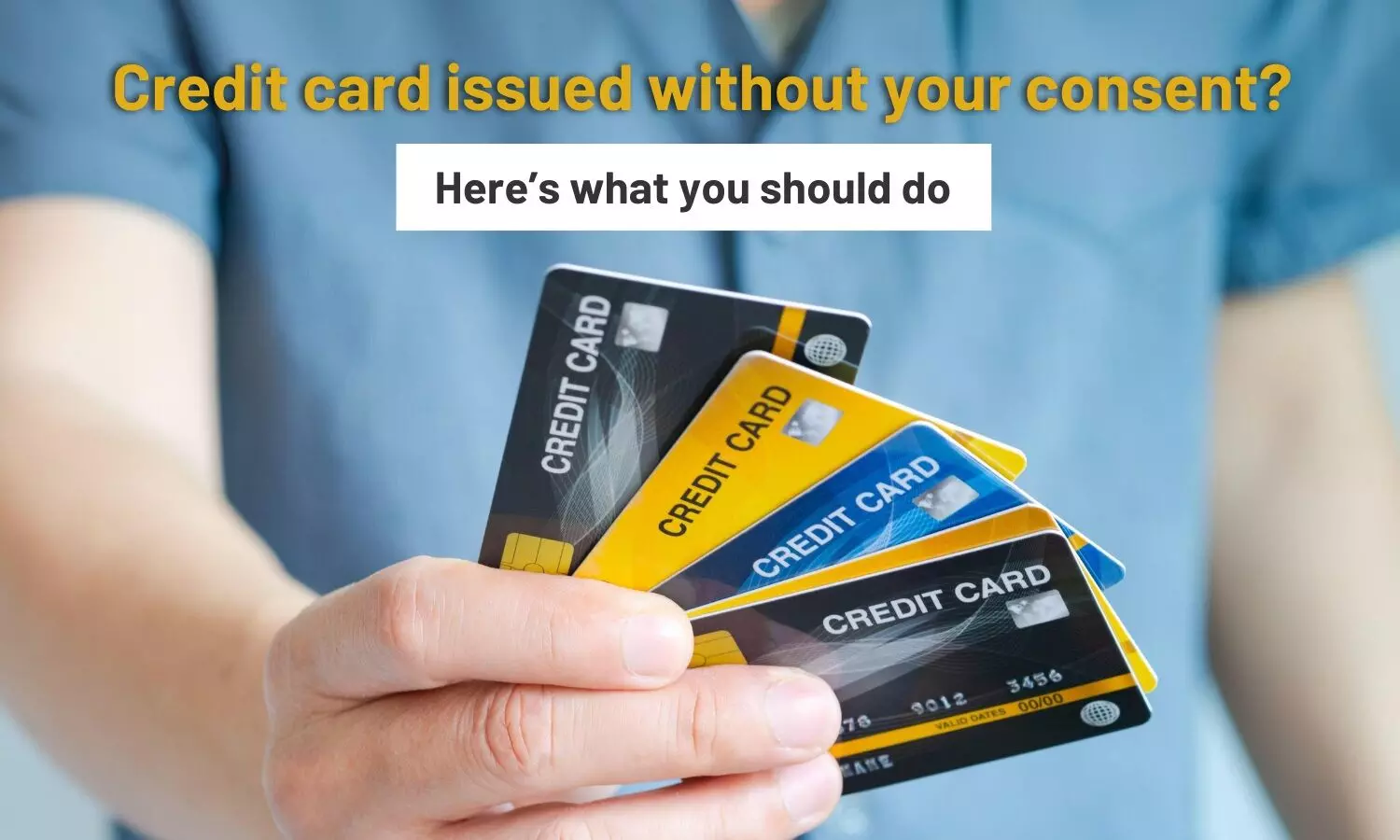What To Do If A Credit Card Is Issued Without Your Consent?
Learn what steps to take if you discover a credit card has been issued without your permission. Protect your finances and identity with these essential tips.
image for illustrative purpose

Receiving a credit card you didn’t apply for can be both confusing and concerning. Fortunately, the Reserve Bank of India (RBI) has put regulations in place to protect consumers from unsolicited credit cards. These rules aim to prevent unwanted debt and potential identity theft. This article will guide you through the steps to take if you receive an unsolicited credit card and explain how the RBI’s regulations safeguard you.
Why Unsolicited Credit Cards are a Problem
Receiving a credit card without your consent can lead to several serious issues:
i) Unwanted Debt - Since you did not plan for the credit line, it can lead to unexpected financial obligations
ii) Identity Theft - If the card is intercepted by someone else, it could be used fraudulently
RBI Regulations on Unsolicited Credit Cards
To protect consumers, the RBI has established strict rules. Credit card issuers, including banks and Non-Banking Financial Companies (NBFCs), are not allowed to send you a credit card unless you have explicitly requested one and given your clear consent. This means no bank or NBFC should send you a credit card without your approval.
What to do if you Receive an Unsolicited Credit Card
Do Not Activate the Card - The first and most crucial step is to avoid activating the card. Activation typically requires entering a PIN or OTP, which indicates your consent to use the credit line. If you do not activate the card, you are not liable for any charges or fraudulent activities associated with it. By not activating the card, you indicate that you do not intend to use it.
Contact the Card Issuer - Next, you should contact the card issuer to report the unsolicited card. Here’s how:
i) Identify the Issuer - Check the card details to determine if it was issued by a bank or an NBFC
ii) Reach Out to Customer Service - Most issuers offer multiple ways to contact their customer service department. Look for a toll-free number specifically for reporting unsolicited credit cards, or use the standard customer service number. Some issuers also provide secure online platforms for such reports
Your Rights as a Consumer
According to the RBI guidelines, you have specific rights if you receive an unsolicited credit card:
1. Non-Activation - Do not activate the card using OTP or any other means
2. Account Closure - If you do not activate the card, the issuer must notify you that the credit card account has been closed without any fees. This notification should be sent within seven working days from the date the issuer sought your confirmation
3. Destruction of the Card- Once you receive the closure notification, destroy the card to prevent any misuse
Penalties for Issuers
Issuers who violate RBI regulations by sending unsolicited credit cards face specific penalties:
1. Mandatory Account Closure - The issuer must close your credit card account at no cost within seven business days of receiving your complaint
2. Potential Penalty - The RBI may impose a penalty on the issuer, serving as a deterrent against such practices and protecting consumer rights
Keeping Documentation
When dealing with an unsolicited credit card, it is crucial to keep all documentation up to date:
1. Record Correspondence - Keep records of all communication with the issuer. Written correspondence proves that you reported the unsolicited card and requested its closure
2. Evidence for Disputes - In case of any disputes or if the issuer fails to respond, your documentation will serve as evidence. This can be useful if you need to file a complaint with the RBI Ombudsman
Filing a Complaint with the RBI Ombudsman
If the issuer does not resolve your complaint within 30 days, or if you are unsatisfied with their response, you can escalate the issue to the RBI Ombudsman. Here’s how
1. Online Complaint - File your complaint online at https://cms.rbi.org.in (https://cms.rbi.org.in)
2. Physical Complaint - Send a physical complaint using the form specified in Annexure ‘A’ of the Reserve Bank - Integrated Ombudsman Scheme, 2021. Mail it to “Centralised Receipt and Processing Centre, 4th Floor, Reserve Bank of India, Sector -17, Central Vista, Chandigarh - 160017”
Understanding Card Usage
A credit card can be considered as ‘used’ even if no financial transactions have been undertaken. Here are some activities that count as usage:
1. Generation of Statement- If a statement is generated
2. Change of PIN- Any change in the PIN
3. Transaction Controls - Any changes made to transaction controls
However, calls made to customer care for reasons other than those mentioned above do not count as card usage.
Receiving an unsolicited credit card can be a hassle, but knowing your rights and the steps to take can protect you from potential problems. Remember, do not activate the card, contact the issuer immediately, and keep all documentation of your correspondence. By following these steps, you can safeguard your rights as a consumer and protect yourself from the misuse of unsolicited credit cards.

